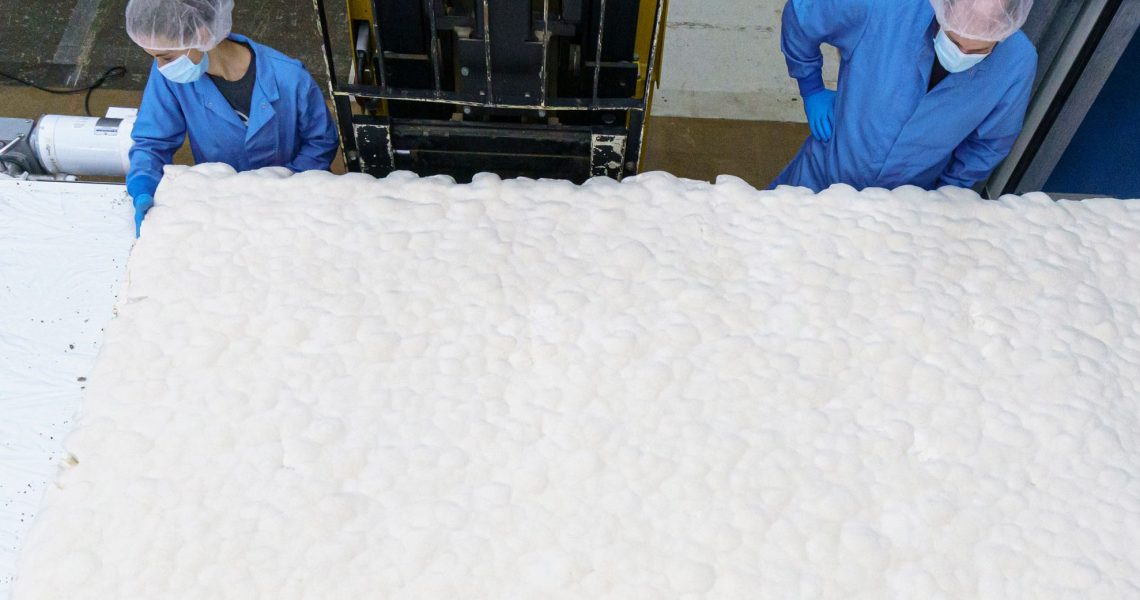Ecovative, the mycelium leather company that holds the largest mycelium foundry in the world, is now working with international multi-brand fashion company Bestseller and PVH Corp. Announced Wednesday, the company is working with innovation platform Fashion For Good to provide the brands with an accessible leather alternative.
The mycelium leather will be used across different product categories in the apparel sectors of PVH Corp and Bestseller. Brands including PVH’s Tommy Hilifiger and Calvin Klein and Bestseller’s Vero Moda will make use of the offering. Most importantly, the cost of the leather is comparable to the mid-range of real leather, making it a viable alternative. Other companies using mycelium leather, like MycoWorks, are targeting the luxury market with their proprietary fine mycelium. Luxury leather goods brand Hermès launched a bag with the material earlier this year.
One of the biggest issues with launching biomaterials for the fashion market is scale. Many biomaterials are not able to be produced at scale or at an average market cost. The launch of the international sustainable fashion cooperative between Ecovative, the mycelium technology company founded in 2007, and global brands Bestseller and PVH Corp., marks an entry for the mid-range fashion market into biomaterials. Algae and other biomaterials are still lagging behind when it comes to production for the mass fashion market.
Most vegan leather products in the fashion industry are made with pleather, or plastic leather. PU leather is a thermoplastic polymer that is typically used in vegan shoes and furniture. As with all plastic products, micro-plastic pollution is a big issue of pleather production. There’s also the problem with life cycle. As plastic becomes brittle over time, it releases microplastics during washing and wearing, and after it’s thrown away. PU leathers and natural leather are also coated with petrochemicals that make it impossible to recycle them. One-hundred percent bio-leather made from mycelium is an alternative that is compostable and does not release plastics into the environment.
“At Ecovative, we’ve developed methodologies of growing these pure mycelium tissues at scale that really unlock the full potential of these different types of tissues in different market applications,” said Gavin McIntyre, co-founder of Ecovative. Starting off in the field of protective packaging, the company makes use of unique mushroom species that are sufficiently strong to support the weight of a person.
With a closed funding round of $60 million in March of this year, Ecovative now plans to develop its next-generation Mycelium Foundry while also growing production ten-fold. The company’s main focus is to scale these products to be meaningfully impactful both on the market and the planet.
Similar to how a plant adapts to light and its surroundings, fungi are known as modular organisms, meaning they respond to their surrounding environment and create new structures based on it. Evocative is working with tanneries around the world to get feedback on how mycelium leather reacts to tanning processes, and it’s adapting the mycelium accordingly through its strain foundry.
Ad position: web_incontent_pos1
“We look to leverage the craftsmanship and artisanal expertise that tanneries have generated over the last few centuries,” said McIntyre. “We provide them with a new substrate or hide, so that they can still take advantage of their institutional knowledge and infrastructure to create a best in class product, from a finish and aesthetics perspective.”
The partnership with PVH and Bestseller is aimed at integrating these materials into different product lines and ensuring that the next generation of mycelium leather meets the needs of the industry, both from a performance and economic perspective. “We are really focused on the democratization of technology, and we want to ensure that these products are economically viable, so that anyone can afford them,” said McIntyre. “That’s why we’ve aligned ourselves with brands that are well-recognized within the marketplace, and we’re continuing to foster more relationships in this area for future work.”
Through this partnership, Ecovative will be able to take feedback from the brands, employ it within its laboratory and, therefore, increase its potential to further scale. “The early brand partnerships have been really helpful, in terms of identifying what the best opportunities for market entry will be. It’s also [shed light on] how manufacturers will engage with these materials and transform them into beautiful products,” said McIntyre.
Mycelium leather is very versatile, able to replace most conventional leathers, irrespective of thickness or natural quality. Ecovative’s brand of mycelium leather is called Forager™ Hides and first launched in March 2021. It is based on five years of research and development in Ecovative’s Mycelium Foundry. The material is grown over nine days in sheets that are up to 24 meters in length and 1.8 meters wide, and have various configurations of tensile strength, density and fiber orientation. No coatings or PVC are needed.




